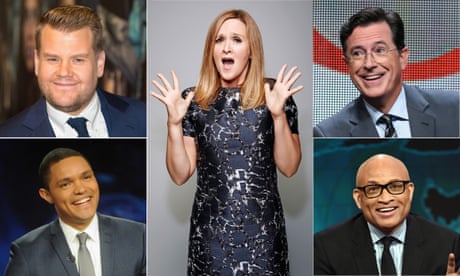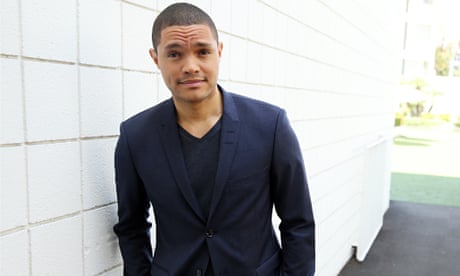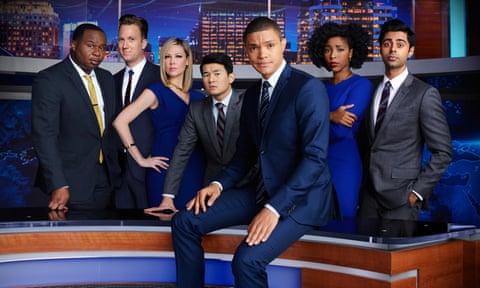Trevor Noah: ‘It’s easier to be an angry white man than an angry black man’
This article is more than 8 years old
Six months ago the South African comic took on the trickiest task in comedy; replacing Jon Stewart as host of the Daily Show. What’s he learned so far? Always keep your cool
Trevor Noah is perched on top of a bank of chairs in the Daily Show conference room. It’s a Friday, which means there’s no live show, and Noah has time to clown around, undergoing half-a-dozen tie changes while being photographed by the Guide. This room is usually the hallowed space where the writers share their ideas and hone jokes for America’s best-known political satire, but right now Noah has his arms outspread and is tottering around as if he’s about to fall over. “That’s good,” says the Guide’s photographer. “Keep doing that airplane thing,” he adds as Noah regains his balance. “Airplane?” asks Noah with faux-incredulity. “That’s what you thought that was? Interesting. This is like a Rorschach test: you see whatever you want.”

Late-night tales: how a new crop of TV hosts is reinventing an old format
Read more
Since the 32-year-old South African took over from Jon Stewart, who retired last August after 16 years in charge, his tenure at the Daily Show has been open to interpretation too. Some see a confident, charismatic comedy talent and a welcome point of difference in a bland – and white – late-night landscape, while others see him as an unwelcome reformist who has defaced the Daily Show that Stewart built.
Speaking to Noah in his office, though, you’d never get the sense this was someone who was described by GQ as “the biggest gamble on late night since NBC hired Conan to replace Letterman”. He talks in punchy, easy-to-grasp metaphors: US politics “is like transfer deadline day in the UK – ‘Ben Carson’s announced it’s official, he’s moving to Trump’”; running The Daily Show is like working out: “You can get good at it but it’s never easy, so right now we’re just getting our fitness up”; and Twitter is like a restaurant “where everyone hates the food but they keep ordering more of it”. At the same time as doling out the aphorisms Noah keeps one eye firmly on three TVs tuned to MSNBC, Fox News and CNN, noting news items or moments for the producers to look at later in closer detail. He doesn’t look or sound like someone who is rattled, more like someone who has a plan and is sticking to it.
Noah points out that the Daily Show is still in its infancy. “I’m a baby in this thing. I’m flattered by the fact people judge me as if I’m not,” he says, before alluding to his other late-night counterparts. “I’m by far the youngest. I’m 32 years old. I jumped into the hottest seat possible and luckily we’ve not crashed the ship.”

Trevor Noah: from Soweto to new host of The Daily Show
Read more
He hasn’t crashed – more like he’s set it on a new course. Ratings have dipped since Stewart’s exit, but more than half of the show’s new viewers are in the all-important 18-34 millennial bracket, which advertisers covet so much. The age of the show’s average viewer has dropped from Stewart’s era when it was nearing 50, and Noah has developed a more diverse audience, too. Under the cool exterior, nicely fitted suits and solid stats, has anything shocked him since he took over?
“The biggest surprise was how much people expect the show to be a journalistic source, which is ridiculous,” he says. “People have found solace in a comedy show. You know what comes before my show? Cartoons that talk about fucking each other in the ass. You know what comes after my show? More fucking in the ass. We’re a comedy network.”
Noah joined the show in 2014 as a correspondent, following in the footsteps of John Oliver, Stephen Colbert, Larry Wilmore and Samantha Bee – all of whom have late-night shows now. He knew the importance of the show to US comedy but was taken aback – when he was handed the job of host – by what people saw his role as being. Comedian? Hardly. Try a mix of analyst, clever best friend and voice of an entire electoral class.
You realise that there are people who want you to feel and articulate for them,” he says. “There are people who believe it is your duty to express their point of view or their anger. I didn’t know that before I got on the show. I just thought people were watching it and enjoying it. People – to a certain extent – have become couch protestors. They want to tweet about the thing and see someone say something and feel like they did something. I come from a world where you get up and you go do something about it.
“In South Africa the youth rose up, the people rose up,” he adds. “You didn’t tweet about the thing, you didn’t watch TV shows about the thing, you made something happen yourself. Satire was seen as an additional tool or a weapon in that arsenal.”
Noah was born in 1984 when South Africa was under white minority rule. Apartheid was still functioning and his parents were from different races – his mother is Jewish-Xhosa and his father is Swiss-German – meaning their marriage was considered illegal by the South African government (he alludes to this in the title of his 2013 standup tour, Born A Crime). He only took up comedy at the age of 22, but in the past decade he’s managed to conquer South Africa – becoming the biggest standup in the country and receiving his own TV show – as well as being booked for mainstream shows in the UK such as Live At The Apollo. Now he has big-name comedy supporters ranging from Dave Chappelle and Jerry Seinfeld to Eddie Izzard.
His style is a mix of observational comedy and knowing jabs at racial stereotypes. On his first live TV appearance in the US (on Jay Leno’s Tonight Show) he played up the confused foreigner shtick, picking holes in the concept of “African-Americans”. It provided a platform that exposed him to a new American audience, including one Jon Stewart. Nothing escapes his critical eye, from the somnambulant delivery of Republican presidential candidate Ben Carson to the left’s silence on Boko Haram’s attacks after the Charlie Hebdo massacre in Paris, and he treats all subjects with a kind of bemused intrigue rather than contempt.
That comedic approach and polished performance saw him handed the reins of the Daily Show in September, just over a month after Stewart’s departure. It was an appointment that GQ called “instantly controversial,” largely due to a cache of old tweets that had been dug up where Noah aimed jokes at overweight women and Jewish people. There was an apology, and calls for him to step down. But unlike Louis CK or Stephen Fry, he hasn’t stepped away from the medium. He’s just wary it can be a place where trouble is easily found. “Imagine if people had the ability to overhear every conversation you were having with your friends,” he says, “and then pick out one sentence that they felt like in the middle of that conversation and then broadcast that to all their people and say, ‘Look at what this guy said.’ Then they come after you, and you say, ‘You don’t even know me.’”
Soon after becoming host Noah made changes in the Daily Show’s writers’ room, bringing in fellow South African comic David Kibuuka and Ugandan Joseph Opio, while former Onion writer Baratunde Thurston was placed in charge of the show’s social media strategy. Noah feels he’s made the writing room more diverse – one of the lingering gripes of the Stewart show was that it was very white – and has made pains to dial back the righteous indignation that became a calling card of the last few years of the previous era.
“For me growing up as a mixed-race person, you’re forced to see both sides,” he explains. “I grew up in a house where my mother was Xhosa, my dad was Swiss, my stepdad was Shangaan, my friends were Zulu. I lived in such a melting pot that I never grew up with a preconceived notion of ‘people’. Because of that it helped my comedy because I could play within the nuance of that world.”
But subtlety and nuance are about as welcome in US political conversation as facts in a Donald Trump speech. That softer approach has led some to accuse Noah of diluting the Daily Show’s established brand, one that called out the hyperbole and bile of Fox News and the American hard right. Slate suggested in January that “this crazy campaign should be [Noah’s] coming-out party. Instead, it’s our first election since 2000 where The Daily Show might as well not exist.”

It’s an argument Noah to which gives short shrift. “I’m trying to build something from the ground up,” he says. “I’m talking about a show where black people weren’t watching it. Now we’re getting black viewers. Should I not have done that then? What’s your argument for that? We’re getting more Hispanic viewers, we’re getting more minority viewers, we’re getting younger viewers. The whole problem in this country is that young people don’t vote, and now people go, ‘Oh, you’re dumbing it down.’ No, I’m creating a show that needs to be created.”
Comedy Central executive Michele Ganeless has described Noah’s approach as being like a “Trojan horse”: he plants ideas and queries norms rather than constructing in-your-face takedowns. For Noah that approach, rather than the angry man routine, is vital, especially because of who he is. “I grew up learning one thing: it’s way easier to be an angry white man than an angry black man,” he says. “White people – for the most part – have always had their anger heard. When white people complain shit gets done, it gets changed. Black people have learned you need to find subtle ways to get your point across. It’s very easy to say, ‘Why aren’t you angry about it?’ Oh, an angry black man? You want me to fall into that?”
There is an awful lot of anger – justified or otherwise – in US politics at the moment, whether it’s the Democrats decrying the rise of the 1% or the Republicans’ troubling calls for bans on Muslims entering the US, but Noah’s plan is to stay above that and pick at the hypocrisy. Does he think it’s been a blessing or a bit of a hospital pass to have inherited the show on the eve of one of the most bizarre presidential campaigns ever?
“I think it’s a great time,” he says. “That was one of the gifts that I got coming in during this cycle. No one has a fucking clue. Go read what journalists were writing eight months ago, see what they were saying: ‘Oh, why Trump will be out by August’; ‘Why Trump will fall out by September’. Now they’re like, ‘What to do if Trump is the nominee.’”
Like a lot of what Trevor Noah says, it all comes back to that Rorschach test: the issue of perception. Have people written him off too soon? Quite possibly. They got it wrong about Trump so why not him? “You start to realise: no one knows what’s going on,” he says. “So this is the perfect time for me to join the race.
News
SHOCKING: Kanye West was suspended from Instagram immediately after making rude comments about Trevor Noah, South Africans were outraged when they learned the truth…/hi
Kanye West suspended from Instagram after slur against Trevor Noah This article is more than 2 years old West used racial slur after Noah criticised his behaviour…
BREAKING NEWS: Trevor Noah did this for Jordyn Taylor while she was struggling with the pain of a great loss../hi
Trevor Noah strolls with new model girlfriend Jordyn Taylor, as her heartbreak after her fiancé was killed in a freak car accident is revealed Smitten Trevor Noah…
BOILING POINT: Caitlin Clark and Rhyne Howard in Explosive Confrontation as Benches Nearly Clear in Fever vs. Dream Drama!
Caitlin Clark, Rhyne Howard exchange words during Fever’s heated win against Dream Caitlin Clark was involved in another heated exchange Getty Images Caitlin Clark had a frustrating night…
Angel Reese Managed To Set Women’s Basketball Back A Quarter Century With The Most Embarrassing 15 Seconds In WNBA History
Angel Reese Managed To Set Women’s Basketball Back A Quarter Century With The Most Embarrassing 15 Seconds In WNBA History Angel Reese (Photo via Twitter) Basketball fans…
Caitlin Clark’s Short Skirt Had Folks On Social Media Saying All Sorts Of Things Ahead Of The Fever’s Game vs. The Dream
Caitlin Clark’s Short Skirt Had Folks On Social Media Saying All Sorts Of Things Ahead Of The Fever’s Game vs. The Dream Caitlin Clark (Photos via Yahoo…
AFTER CAITLIN CLARK WAS FLOORED, SOPHIE CUNNINGHAM EXPLODES: ‘ENOUGH IS ENOUGH!’ – Sparks Outrage as She Calls Out WNBA Vets for ‘Targeted Attacks’ and a League That Turns a Blind Eye!
WATCH: Caitlin Clark Drops to the Floor in Disbelief After Sophie Cunningham’s Impressive Half-Court Shot The Indiana Fever have made it known that they are hunting for…
End of content
No more pages to load









